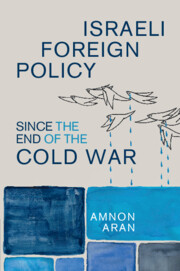Book contents
- Israeli Foreign Policy since the End of the Cold War
- Cambridge Middle East Studies
- Israeli Foreign Policy since the End of the Cold War
- Copyright page
- Dedication
- Contents
- Maps
- Figures
- Acknowledgements
- Chronology
- Abbreviations
- Maps
- Introduction
- 1 Entrenchment
- 2 Redirection
- 3 On the Brink of Peace?
- 4 Engagement Incomplete
- 5 Engagement under Assault
- 6 The Dividends of Engagement
- 7 Unpicking the Oslo Accords
- 8 Backtracking
- 9 Just Beyond Reach
- 10 Between Engagement and Unilateralism
- 11 In Search of a Foreign Policy Paradigm
- 12 A Perfect Storm
- 13 The Road Map for Regime Change
- 14 The Resurgence of Unilateralism
- 15 Events Dear Boy, Events
- 16 The End of the Road
- 17 Vulnerable Ties
- Epilogue: Israel’s Wondrous Decade?
- Appendix List of Persons Interviewed
- References
- Index
- Books in the Series
11 - In Search of a Foreign Policy Paradigm
Published online by Cambridge University Press: 15 December 2020
- Israeli Foreign Policy since the End of the Cold War
- Cambridge Middle East Studies
- Israeli Foreign Policy since the End of the Cold War
- Copyright page
- Dedication
- Contents
- Maps
- Figures
- Acknowledgements
- Chronology
- Abbreviations
- Maps
- Introduction
- 1 Entrenchment
- 2 Redirection
- 3 On the Brink of Peace?
- 4 Engagement Incomplete
- 5 Engagement under Assault
- 6 The Dividends of Engagement
- 7 Unpicking the Oslo Accords
- 8 Backtracking
- 9 Just Beyond Reach
- 10 Between Engagement and Unilateralism
- 11 In Search of a Foreign Policy Paradigm
- 12 A Perfect Storm
- 13 The Road Map for Regime Change
- 14 The Resurgence of Unilateralism
- 15 Events Dear Boy, Events
- 16 The End of the Road
- 17 Vulnerable Ties
- Epilogue: Israel’s Wondrous Decade?
- Appendix List of Persons Interviewed
- References
- Index
- Books in the Series
Summary
Chapter 11 examines Israel’s foreign policy amid the demise of the Barak government and the rise to power of Ariel Sharon. As the Barak government entered its final phase, Israel’s foreign policy was marked by a serious contradiction. The minority government, headed by Barak, sought to salvage the peace process - by accepting the Clinton parameters for an Israeli-Palestinian final peace. However, the security network defied government by deploying overwhelming military force in response to the eruption of the al-Aqsa Intifada. Amid this Janus-faced foreign policy, the chapter explains the rise of Ariel Sharon to power, which was marked by a quandary. Sharon came to power as Israel’s engagement foreign policy stance was discredited. However, the idea of restoring Israel’s foreign policy of entrenchment and its corollary of clinging to a Greater Israel was also unfeasible as Israel remained signed up to the Oslo agreements. Thus, the foreign policymaking circle surrounding Ariel Sharon, who had a reputation for uncompromising resolve, determination, and tenacity, was left searching for a foreign policy paradigm.
- Type
- Chapter
- Information
- Israeli Foreign Policy since the End of the Cold War , pp. 239 - 261Publisher: Cambridge University PressPrint publication year: 2020

